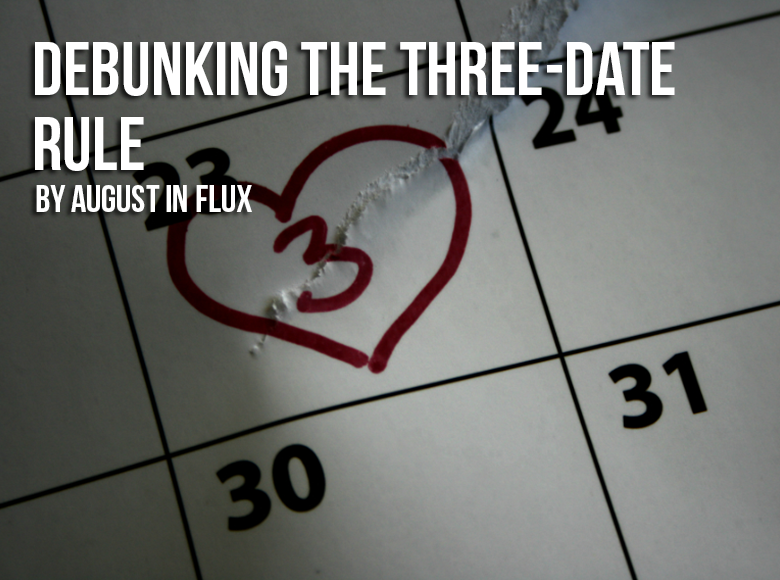Having a script for how we’re supposed to behave can be a great security blanket. Someone asks, “How are you?,” and you say, “Fine.” You see someone you haven’t seen in a while, and you say, “Well, it was great running into you,” at the end of the conversation. These social scripts smooth out social interactions.
Limiting the possibilities for our interactions to these scripts can cause trouble, though, and the biggest arena I see this trouble play out is in the world of sexual relationships. The dating world is ripe with confusion regarding how we’re supposed to behave versus how we need to actually behave in order to have healthy and satisfying relationships. In the realm of dating, the timing of sexual acts is frequently seen as one of the indicators of how serious a relationship is, or as a predictor of how long the relationship will last (i.e. “why buy the cow when you can get the milk for free?”). So let’s just take a few minutes to debunk one of the most common dating scripts: the three-date rule.
What is the Three-Date Rule and Who Uses It?
The three-date rule states that one must wait three dates to have sex with a new partner. This rule plays on some very basic assumptions we make about sexuality in general. First off: this rule applies almost exclusively to heterosexual people. Queer folks have their own stereotypical rules of dating (like gay men and one-night-stands, or lesbians and U-Hauls*), most of which contradict heteronormative sex rules.
Responsibility and Shame
Because this rule applies mostly to straight folks, it heightens the gendered expectations in relationships. The three-date rule plays on the idea that men always want sex, while women are the gatekeepers, which puts women in charge of men’s sexuality and causes a whole slew of problems. If women are in charge of whether or not men have sex, it takes all the responsibility for acting like compassionate human beings out men’s hands and likens them to animals, acting out of instinct and completely incapable of reason. Besides being demeaning to men, this mindset also supports rape culture, because it creates the reasoning that if a man rapes a woman, then she must have done something to open the gate. She must have flirted with him, or worn a short skirt and heels, or taken the ring off her finger—because those are signs that “gate is open—man can have sex now!” (Do me a favor and read that in a caveman voice, because that’s exactly how devolved this mindset is.)
Another problem caused by the notion of women as gatekeepers of sex is the denial of female sexuality. Men are not the only people made stupid by the human drive for sex. Many of us have felt that brain-fog when our crush in junior high noticed us, or that rush of “I don’t care what happens afterward” right before that first kiss. At the very least, we’ve seen people swoon over each other in movies. It’s a human thing, not a guy thing. Female bodies are actually more responsive to sexual stimuli, and denying that lends support to the shame surrounding female sexuality. Imagine taking shame out of the equation surrounding sex—how much freedom would come from it?
Now take that lack of shame and put it into the three-date rule. It doesn’t fit, does it? That’s because the three-date rule is centered around “appropriate” and “proper” times for women to say yes to sex, when in reality there is no “proper” time. There’s only the time that fits well for that given relationship. For some partners, sex is the first thing to happen, and the getting-to-know-you bit happens much later. For other couples, one or both partners need an established emotional intimacy before anything remotely sexual gets introduced. And for a large amount of the U.S. dating population, we need something in between those two. Hard and fast rules don’t work when we apply them to very individual and unique contexts.
To Each Their Own
I like to think of each new relationship in my life like water: it seeks its own level. Each relationship is like a different container, but ultimately the surface is level because I’m seeking the same respect and love. Sometimes that love comes in the form of sex, sometimes in the form of abstinent cuddles. Ultimately, whether or not I have sex with someone depends greatly on a number of factors, predominantly chemistry and trust, not on how many dates we’ve had.
Side Note: the following are tales of three loves. I am purposely avoiding gendered pronouns because no matter how enlightened you are, everyone puts gendered expectations and explanations onto simple “he/she” language. I’m disallowing you, dear reader, to assume I’m treating a given partner a certain way based on their gender as part of my exercise in debunking this dating rule.
The first lover, I hated right off the bat. I thought they were an arrogant know-it-all, and I couldn’t have been less impressed with them. A year later, we met in a different context, and I found that we actually had a lot of similar life experiences. We got to talking and I loved the way they thought about things. I started running into them at clubs, and finally one night, amidst the pulsing bass and the crush of hot bodies, we kissed. And, oh my—that kiss. That’s how it went for several months: meet up with friends at clubs, dance, kiss, go home. Then, one night in November, our friends were heading out and I knew: tonight was going to be the night. …which frankly sucked, because I was sick with a cold, and I knew that I should be home in bed, having soup and going to sleep early. But this person wanted me to come out—texted me specifically to make sure I was going—and I knew that if I went, I’d get laid. We met at the club, we danced all night, we drove back to their place, and we spent the night entangled in each other. No official dinner-and-a-movie dates involved. We’d spent copious hours in discussion groups, in hangouts with friends, in all the getting-to-know-you moments with other people around, and it wasn’t necessary for us to date before having sex. I knew how they took care of their sexual health, how many partners they’d had, and their STI status before we had sex, and to me, that was more important than waiting for three “official” dates.
I met the second lover through the first. My first impression of this lover was that I wanted nothing more than spend many long hours having glorious, athletic sex with them—they were the athlete, not me. I started getting to know this one very slowly as the end of my first sexytimes week with my first lover rolled around. My first time with this lover was actually a threesome with my first lover as well, which was nice because I was still recovering from being sick and having someone else there gave me a little bit of the rest I needed. Two years of having sex later, my second lover and I finally went on a date. But we did it completely backwards from how dates are “supposed” to go. You know that script for dinner-movie-sex-walk of shame? I went over to their place the night before, and we had sex, started the movie, slept, woke up, had sex again, showered, and then went out for breakfast and a walk around the park. For us, the sex needed to happen first in order to get to the point where we felt comfortable enough talking about the rest of life.
I met my third lover, the most recent, through a mutual friend. This lover was just out of a long-term relationship, and I figured I was going to be the rebound. We started out having chaperoned dates with our mutual friend as the buffer, because we did not know each other at all. A few dates in, we took off the training wheels and went on our first un-chaperoned date. I remember sitting on my hands so that we would actually talk. Similar to my second lover, the chemistry between us was electric and I found it difficult to do the get-to-know-you bit with my tongue down their throat. We started having manual sex before they were tested, and after we knew the results, we proceeded on to the many other types of sex.
I specify manual sex here to highlight another shortcoming of the three-date rule: it doesn’t define “sex.” Many people tend to think of “getting laid” as penis-in-vagina sex, but there are a whole range of sex acts that can be considered “sex” (i.e. manual, oral, anal). What one person classifies as “sex” may be completely different and no less valid than what another person calls “sex,” and waiting on one type in particular doesn’t mean you aren’t having sex in general.
Looking back at the rest of my dating life, I have never followed the three-date rule, and you know what? I’m still here, I’m still standing, and I’m only as slutty as I call myself. I am living proof that the timing of sex between two people does not revolve around what other people think. I expect my partners to be responsible for their own sex drive, and respectful of my humanity, and I think that’s a much better rule for when to have sex than measuring out three dates.
* Author’s Note: The jokes typically run along these lines: “What does a gay man bring on a second date? …What second date?” (Because gay male culture is stereotyped as only capable of one-night stands.) “What does a lesbian bring on a second date? A U-Haul.” (Because lesbians are notorious for moving in together very quickly after starting to date.) Warning: if you are straight and you tell these jokes, that is considered homophobic.

Photo by Sara Slattery


